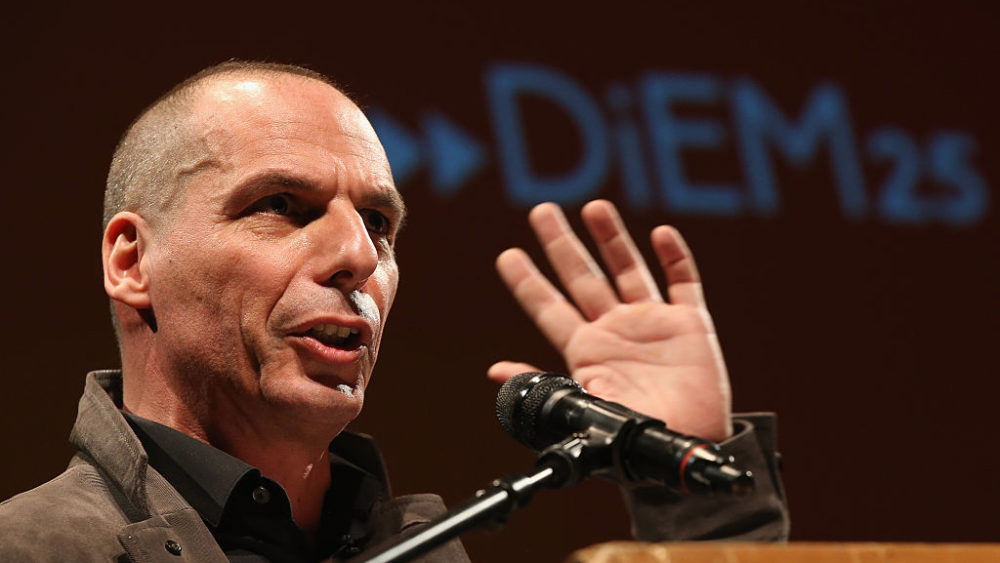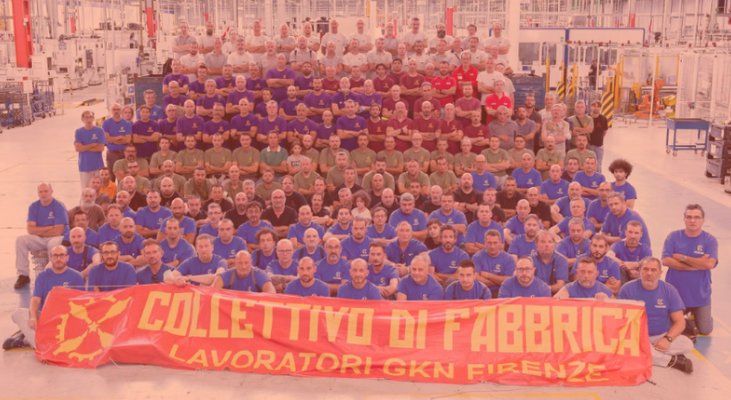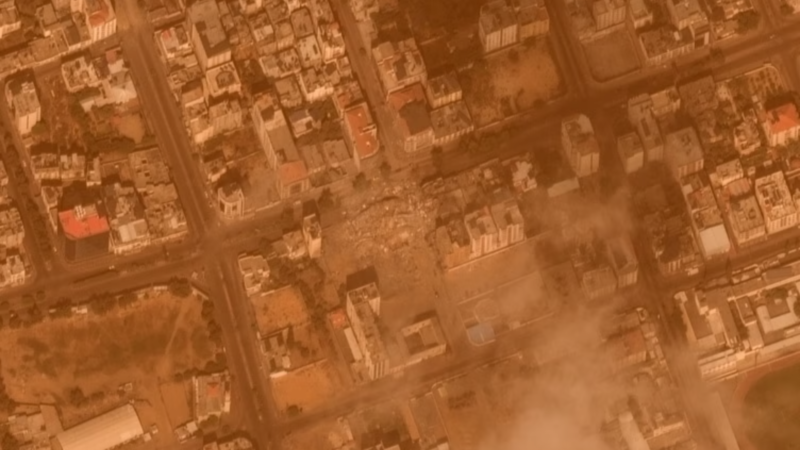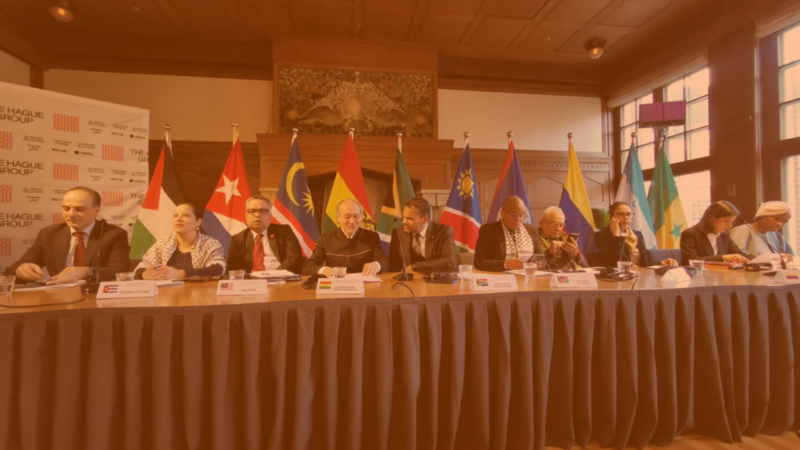Yanis Varoufakis, MeRA25 MP and DiEM25 co-founder, interviewed for the Great Transition Initiative.
What inspired your career trajectory from academic economist to prominent supranational activist?
I went into politics because of the financial crisis of 2008. Had financial capitalism not imploded, I would have happily continued my quite obscure academic work at some university. The chain reaction of economic crises, financial bailouts, and the rise of what I call the Nationalist International that almost broke financial capitalism, and brought Greece severe hardship, had a profound impact on me.
In the early to mid-2000s, I was beginning to feel that a crash was approaching. I could see that global financial imbalances were growing exponentially and that our generation or the next would be hampered by a systemic crisis.
I left my cocoon writing about mathematical economics and moved from Sydney to Athens at the time Greece was becoming insolvent. I began writing about the current situation and appearing on TV, warning against covering up insolvency with bailouts. Through these appearances as well as writing about government’s role in averting the impending crisis, I drifted into politics.
The second transition, from government to activism, was much simpler. Restructuring Greece’s debt was my top priority as Minister of Finance. The moment the Prime Minister surrendered to the austerity demands of the European Commission and accepted another loan without debt restructuring, resignation became the easiest decision of my life. Once I resigned, I was back in the streets, theaters, and town hall meetings setting up the Democracy in Europe Movement 2025 (DiEM25). I saw activism as the best way to confront the political and banking establishment. Four years later, in July 2019, our Greek branch, entitled MeRA25, entered Parliament with nine MPs. The fight continues.
You are one of the sharpest critics of neoliberalism today. How would you define “neoliberalism”?
To begin, let me challenge the term “neoliberal.” The use of the term in relation to West-Soviet relations was just a cloak under which to hide libertarian industrial feudalism, but neoliberalism has as much to do with financialized capital post-1970s as it does with Cold War geopolitical relations. Similarly—and I know this is a controversial statement—there’s nothing neoliberal about the world we live in today. It is neither new in the sense of “neo” nor liberal in the sense of fostering democratic values. Look at what has been happening in Europe over the last decade. Gigantic bank bailouts are funded through taxation. There is nothing really “neoliberal” about the use of such vast subsidies from the public to finance capitalists.
Even under the government of Margaret Thatcher in the UK from 1979 to 1990, the height of so-called neoliberalism in the UK, the British state grew rapidly, becoming bigger, more powerful, and more authoritarian than ever. We witnessed a state that was weaponized on behalf of the City of London to the benefit of a very small segment of the population. I don’t think we should concede the term “neoliberalism” to the brutish establishment using state power to redistribute wealth from the haves to the have-nots.
How has this “brutish establishment” become so dominant in shaping the global order?
The first two decades after World War II were the Golden Era of capitalism for a very simple reason: Franklin Roosevelt’s New Deal was projected onto the rest of the West under the Bretton Woods system. It was a remarkable, though imperfect, system, a kind of enlightenment without socialism. Structures to restrain financial capital were put into place. Banks could not do as they pleased; that’s why bankers hated the Bretton Woods system. Recall that Roosevelt banned bankers from attending the Bretton Woods conference and subjected them to reserve controls and rules against shifting money across international borders.
The result of the Bretton Woods system was a remarkable reduction in inequality concurrent with steady growth, low unemployment, and next to zero inflation. The system was predicated upon the US’s status as a surplus country, recycling wealth through Europe and Japan in a variety of ways. By the end of the 1960s, however, the Bretton Woods system proved unsustainable. The US began to incur trade deficits with Europe, Japan, and later China at the same time Wall Street, unrestrained by regulatory boundaries, attracted most of the profits from the rest of the world.
Unshackled financial institutions began creating what amounted to private money. Holding an inflow of $5 billion daily for a mere five minutes was enough to divvy it up into derivatives, opaque investment instruments that contributed to the 2008 financial crisis. This and other forms of financial engineering produced huge volumes of private money, the value of which, as in the 1929 crash, eventually collapsed in domino-like fashion. Authorities in Washington, Brussels, Paris, and Athens immediately transferred the resulting losses onto the shoulders of taxpayers, a form of socialism for bankers. I described this colossal mishandling of our financial system in my 2009 book The Global Minotaur, six years before I became the Greek Minister of Finance.
When I became Minister, I believed that a global crisis of capitalism was underway. Imagine, then, my walking into a meeting of the Eurogroup with all the European finance ministers in the room who knew I held this view. I was the red flag in the eyes of the establishment. In the same vein, the German ambassador to Greece and one of the most powerful (and most corrupt) Greek bankers had warned the future, democratically elected Prime Minster that my appointment as Finance Minister would cause them to close ATMs across the country and lead to collapse of the Greek banking system.
Given your experience inside and outside government, do you believe that there is a fundamental tension between capitalism and democracy?
Yes. Compare the character of a democratic election with a general meeting of shareholders of a private corporation. Both are elections, but in the democratic process, the one person-one vote rule applies, whereas in the corporate process, you have one share-one vote, essentially a wealth-based voting structure. My fellow economists, especially the true believers in free markets, love to portray the market as a voting mechanism. It is true that every time you buy a tub of yogurt, you are voting in favor of that brand. The same applies when you buy a Ford as opposed to a Volkswagen. The more money one has, the more votes one casts.
So, if you think of capitalism as a voting mechanism, it is anti-democratic in the sense that money determines power. The evolution of capitalism over the last few centuries is a history of the constant transfer of power to the wealthy, including the power to make decisions that affect the distribution of income.
Over time, power has been redistributed from the political sphere to the economic sphere. Until the early eighteenth century, there was no difference between these spheres. If you were the king or the baron, you also were rich. And if you were rich, you belonged to the nobility. With the rise of capitalism, a lowly merchant could become economically powerful. As the separation of the political and the economic evolved, power gradually transferred to the latter. What we now call democracy is not real democracy given the growing influence of economic power. To be sure, the voting franchise has been extended to all males (from only landowners), to women, and to blacks. A parallel democratization process has not occurred in the economic sphere, where power has become less inclusive and increasingly concentrated.
From the 1870s to the 1920s, democracy gradually became disempowered as the corporate world—a democracy-free zone—emerged. Since the end of the Bretton Woods system in the 1970s, power has migrated to finance. Goldman Sachs suddenly became more important than Ford, General Motors, or General Electric. Even corporations like Apple and Google are increasingly becoming financialized. Apple, for example, is sitting on hundreds of billions of dollars, and it is operating more like a financier than an iPhone producer.
This dynamic guarantees that when we vote, an act of celebrating democracy, we increasingly are participating in a sphere that has become totally disempowered. Capitalism is predicated on defeating democracy, even as the democratic cloak continues to legitimize the prevailing system.
Given this fundamental tension between capitalism and democracy, do you believe the European Union can be reformed? And if so, how?
We must aim for something much closer to a democratic federated Europe than what we have now. The tragedy is that the moment you start making such a case as the only antidote to disintegration, you serve the cause of nationalists, xenophobes, racists, and fascists. In ten years, either we’re going to have a democratic federated European Union, or the political monsters will be victorious.
How do we achieve a future democratic federation? The most urgent and difficult task is to go out into the streets of Athens, Rome, Berlin, Paris, and Lisbon and have a discussion with people about the crisis the EU faces. Many don’t want to hear about Europe’s future anymore. What used to be a very attractive vision of a unified Europe as a larger homeland for all its citizens has become toxic in the minds and the hearts of many Europeans. For them, the democratic European Union has become synonymous with an anti-humanist, even totalitarian, vision. We need to construct a new vision to counteract this kind of thinking.
You have been at the forefront of the recently formed Democracy in Europe Movement 2025 (DiEM25). Tell us about DiEM25’s pan-European mission and strategy.
DiEM25 seeks to put forward proposals that stimulate cooperation that is truly democratic. This will take time and will require recreating European institutions and a political economy that includes a massive Green New Deal or similar strategy. We must spend immediately at least 500 billion Euros annually on green energy, green transport, and a green transition in industry and agriculture. We can do this by creatively harnessing the power of existing institutions. The European Investment Bank, for example, could issue bonds worth half a trillion Euros every year, with that money going toward good-quality green jobs and technologies. The European Central Bank, sitting on the sidelines, could be ready to buy these bonds if needed to keep inflation in check. At the same time, we must engage with a broad spectrum of groups to stabilize Europe and so to bring back hope. With that movement underway, we can then have a discussion about democratic governance of the EU.
I’m an old-fashioned lefty. I don’t believe in destroying institutions. I believe in taking them over and transforming them into true public servants.
What does DiEM25 offer beyond the proposals of parties like Die Linke in Germany, Podemos in Spain, or other Green or Left parties throughout Europe?
Most members of these groups are our friends and comrades. We share a humanist attitude towards life and capitalism. The reason we created DiEM25 is that the major crises in Europe require local and national action as well as pan-European, if not global, action. It makes no sense to prioritize the local and national over the transnational, or vice versa. We must operate simultaneously at all levels.
For example, the design of urban transportation systems must consider the planetary, or systemic, impacts of alternative choices. The problem with national political parties is that they are not very good at such systemic thinking. What we need in Europe is a pan-European movement, which is more than a confederacy of autonomously operating states that make promises to local and national electorates independently of one another and then get together in Brussels to discuss the promises that each has committed to. This model is doomed to fail.
When DiEM25 was inaugurated in February of 2016, we sought to bring together Podemos, Die Linke, and allies from the UK to develop a Green New Deal for Europe. We hoped to unify such movements around a common pan-European program. It didn’t work out that way. Why? Die Linke comprises two distinct groups: one faction believes that the European Union is beyond redemption and should be dismantled; the other believes that the EU is salvageable through democratic activism and social transformation, a view shared by DiEM. This division between supporters of “exit” and “remain” stood in the way of an alliance.
Another impediment to unity was that Podemos and others opposed a European voice in national and local policies and decision-making. What is Podemos going to say, for example, about the level and allocation of investment funds among member states? If a Podemos candidate is elected to the European Parliament, what financial policies will she support? We need clarity and unity on such issues—to have a voice not of a Greek, a German, or a Spaniard, but of a European internationalist. We will continue to struggle to create a unified, coherent agenda for all of Europe. Unity without cohesion is the curse of the left.
Let’s not forget that the historical call was not for workers of each nation to organize within their borders. It was for workers of the world to unite.
Are there lessons to be learned from previous episodes of leftist internationalism, such as the Internationals, for our current time of global mobilisation?
There are many lessons. Anybody who doesn’t learn from history is a dangerous fanatic. Lesson number one is that socialist nationalism is the worst antidote to national socialism. Remember what happened in World War I when the German Social Democrats were co-opted into a nationalist agenda and supported the war effort of Germany against the much of Europe. That kind of socialist nationalism will always be gobbled up by Nazism. Anyone who supports a left-wing agenda and at the same time supports a nationalist, populist workers agenda is going to be devoured by fascists. They will end up effectively blowing wind into the fascists’ sails, intentionally or not.
Lesson number two is that Internationals fail if they are just a confederacy of national parties. The moment agendas and organizations are nationally based, as was the case in postwar Communist parties, the international movement will inevitably fragment and collapse. This is why DiEM25 places all its energies into not becoming a confederacy of a Greek DiEM25, a German DiEM25, and an Italian DiEM25. This is not a theoretical matter, but a practical one: transnationality as opposed to confederacy is critical to building a new, progressive political enterprise. Studying the failures of earlier Internationals is fundamental in shaping this strategy.
To be clear, when we created DiEM25, we envisioned a movement, not a party. And it remains a movement, but we decided about a year ago to create our own “electoral wings” in each country. In Germany, DiEM25 created Democratie Europa (“Democracy in Europe”); in Denmark, Alternativet (“The Alternative”). In short, if you are a member of a DiEM25–created party, you also are a member of the larger movement. But you also can be a member of the larger movement without membership in a DiEM25-created party.
In a forthcoming book, you imagine “another world” in 2035 in which global financial capital is essentially demolished. What would this world look like? What would it take to get there?
I begin with the view that the present system is, simply stated, both awful and unsustainable. My story is told from the perspective of 2035, when my characters discover that, back in 2008, at the height of our crisis, the timeline split into two: one that you and I inhabit and another one that yielded a post-capitalist society. It is my narrative strategy for sketching out how post-capitalism could work and feel today had our response to the 2008 been different.
My forthcoming book, entitled Another Now: Dispatches from an Alternative Present, asks the following questions: Could the world be non-capitalist or post-capitalist? Could we see humanism in action? What would it look like? What would socialist corporations look like? How would they function? How would democracy function? What would happen to borders, migration, and defense? I try to create a vision of a liberal, socialist society that is not based on private property but does use money as a vehicle for exchange and markets as coordinating devices. I preserve money and markets because the alternative would be to fall to some fearsome hierarchical control, which, for me, is a nightmare scenario.
A deep transformation of values and institutions is essential to building a world of solidarity, well-being, and ecological resilience—what we call a Great Transition—is more urgent than ever. In a dark time, what basis for hope and advice can you offer fellow internationalists at this critical, historic moment?
We have the tools necessary in order to spend at least five percent of the global GDP on a Great Transition that saves the planet. Technically, we know how to create a new Bretton Woods, a progressive Green New Deal that diverts resources to saving the planet and creating quality green jobs across the globe.
To achieve such a future, we must offer a cautionary note regarding the role of borders. Some on the left are unfortunately moving toward the belief that migrants are a threat to domestic workers. That is a right-wing narrative that is factually untrue. We need to emancipate progressives from the notion that strong borders protect the working class. They do not. They are a scar on the face of the Earth, and they harm labor across the world.
Do you want to be informed of DiEM25's actions? Sign up here















